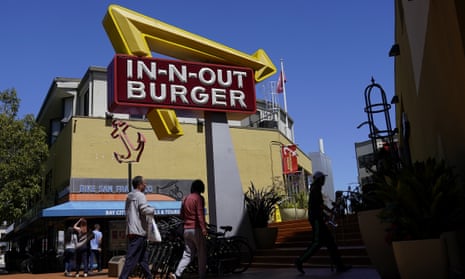California lawmakers approved a nation-leading measure that would give more than half a million fast-food workers more power and protections, over the objections of restaurant owners who warn it would drive up consumers’ costs.
The bill will create a new 10-member Fast Food Council with equal numbers of workers’ delegates and employers’ representatives, along with two state officials, empowered to set minimum standards for wages, hours and working conditions in California.
A late amendment would cap any minimum wage increase for fast-food workers at chains with more than 100 restaurants at $22 an hour next year, compared with the statewide minimum of $15.50 an hour, with cost of living increases thereafter.
“We made history today,” said the Service Employees International Union president, Mary Kay Henry. “This legislation is a huge step forward for workers in California and all across the country.”
Workers told the Guardian earlier this year they hoped the legislation would help fight low pay, poor working conditions, and a lack of safety protections, problems that have worsened during the pandemic.
“There are a lot of laws protecting workers but nobody is implementing or doing anything about it. We are essential workers but not treated like that. With the Fast Recovery Act, we’ll be heard,” Maria Yolanda Torres, who has worked at a Subway store in San Jose, California, since May 2018, said in March.
A survey of fast-food workers in Los Angeles published by the UCLA Labor Center in January found workers reported lack of paid sick leave, widespread lack of enforcement of Covid safety protocols and economic insecurity.
More than 40% of workers surveyed reported not having enough money to afford groceries during the pandemic, and nearly half said they were doing more than one job to try to make ends meet. Among workers who said they had expressed workplace concerns to their managers, 25% said they had experienced retaliation for doing so.
The senate approved Monday’s measure on a 21-12 vote, over bipartisan opposition. Hours later the assembly sent it to the California governor on a final 41-16 vote, both chambers acting with no votes to spare.
Debate split along party lines, with Republicans opposed, although three Democratic senators voted against the measure and several did not vote.
“It’s innovative, it’s bringing industry and workers together at the table,” said the Democratic senator Maria Elena Durazo, who carried the bill in the Senate. She called it a “very, very well-balanced method of addressing both the employers, the franchisees, as well as the workers”.
Almost every Republican senator spoke in opposition, including Senator Brian Dahle, who also is the Republican nominee for governor in November.
“This is a stepping stone to unionize all these workers. At the end of the day, it’s going to drive up the cost of the products that they serve,” Dahle said.
He added later: “There are no slaves that work for California businesses, period. You can quit any day you want and you can go get a job someplace else if you don’t like your employer.”
Restaurant owners and franchisers cited an analysis they commissioned by the UC Riverside Center for Economic Forecast and Development saying that the legislation would increase consumers’ costs. The administration of Governor Gavin Newsom also fears the measure would create “a fragmented regulatory and legal environment”.
The debate has drawn attention nationwide, including on Capitol Hill where the Democratic congressman Ro Khanna has expressed hope it will trigger similar efforts elsewhere.
It was “one of the most significant pieces of employment legislation passed in a generation”, said Columbia Law School labor law expert Kate Andrias. She called it “a huge step forward for some of the most vulnerable workers in the country, giving them a collective voice in their working conditions”.
